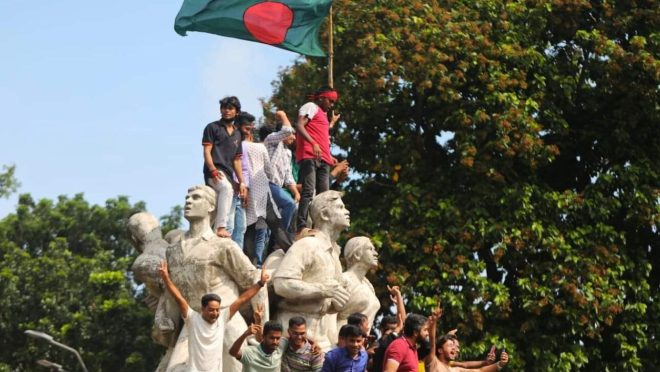The new liberation: A legacy of unfailing student power in Bangladesh
The new liberation: A legacy of unfailing student power in Bangladesh

“Rage, rage against the dying of the light” – Dylan Thomas.
August 5, 2024
Today, the air in Bangladesh is filled with the fresh smell of freedom—raw, fierce, and drenched in blood. Once more, the students’ unyielding resolve has determined the nation’s very destiny.
Students have consistently been at the forefront of Bangladesh’s history at every critical juncture—including the Language Movement in 1952, the mass uprising of 1969, the Liberation War of 1971, and the protest against dictator Ershad in the 1990s.
In retrospect: July 2024
Shahbag: The epicentre of the revolution
A movement that would soon sweep the nation was born in July, as the students assembled in Shahbag. They demanded reforms to the unjust quota system under the banner of “Students Against Discrimination.”
On July 15, the government responded with brutal force, assaulting students at Dhaka University.
However, the voices of dissent were only further energised by this repression, which was intended to suppress them. Across the nation, universities, both public and private, united in solidarity.
On 18 July, the state resorted to extreme measures: an internet blackout, the imposition of curfews, and the use of military force, including firing from helicopters. The army opened fire on unarmed protesters.
The nation saw in utter shock and disbelief how brutally the young people were murdered before their very eyes. Anyone could mistake the horrific scenes for the war-devastated Gaza and the regime’s accurate portrayal of the oppressor Israel.
The once peaceful streets were transformed into battlegrounds. The regime’s use of tear gas, rubber bullets, and live ammunition against unarmed citizens horrified the nation. Even children were subjected to indiscriminate violence, as the brutality extended to the confines of their homes.
Despite facing arbitrary arrests, torture, and night raids, the students’ resolve remained unshaken and unbroken. The coordinators of “Students Against Discrimination” were taken into police custody and subjected to severe torture, but they simply refused to surrender.
Their courage became contagious, spreading beyond campuses and inspiring ordinary citizens to join the cause. What began as a movement for educational reform evolved into a nationwide uprising against an oppressive regime.
Now all the previous demands boiled down to a single demand: the fall of this fascist regime.
The fall of a regime
A 15-year dictatorship fell in 15 days as a breathtaking demonstration of defiance defied bullets and gun barrels.
The Long March to Dhaka, which had been announced earlier, was an overwhelming success on 5 August as people from all walks of life made their way to Dhaka and subsequently encircled Ganabhaban.
After Prime Minister Sheikh Hasina resigned and fled the nation, they celebrated their victory, and her autocratic rule came to an end.
The mighty Gen Z
Generation Z, the youth of Bangladesh, has proved to be the powerhouse that has propelled the movement forward. Even though they were perceived as being self-centred, too busy with their phones, and absorbed in social media, this generation just proved everyone wrong.
Although they haven’t witnessed the 1971 Liberation War, they could now take pride in their own triumph—a rebellion that had liberated their country from oppression.
The fallen heroes
We must not forget the heroes who made the supreme sacrifice so that we can enjoy this hard-won freedom. The first martyr of this uprising, Abu Sayeed, defied the dictatorship with courage and bravery, becoming a symbol of defiance.
We pay tribute to Mir Mugdho, who generously handed water to his fellow demonstrators just before he was shot in the head. We remember Rafi, Shanto, Wasim, Tahmid, Yamin, Tanvin, Farhan, Irfan, Fahad, Shakil, Zafor, Tasauf, and every other soul whose life was cut short in the movement.
Finally, we remember Abrar Fahad, a student at BUET who was assassinated in 2019 for his vocal defence of free expression. He was a victim of the Bangladesh Students’ League, the student wing of the now-fallen regime.
To Abrar and all the martyrs, we say: Your sacrifices were not in vain. We have won. We hope you all are watching this and smiling up from heaven.
Here comes the sun.
Today, we stand at the threshold of a new era. The legacy of student power in Bangladesh is as strong as ever, and the nation’s future now lies in the hands of its youth.
The crucial task before us is to rebuild and reform our country, ensuring that the values of justice, equality, and freedom are upheld.
We salute the courage and sacrifice of our young heroes. Bangladesh will forever be indebted to its students, who have once again proven to be the torchbearers of change. Now, it’s time for all of us to come together and build a nation worthy of their legacy. The work begins now.


